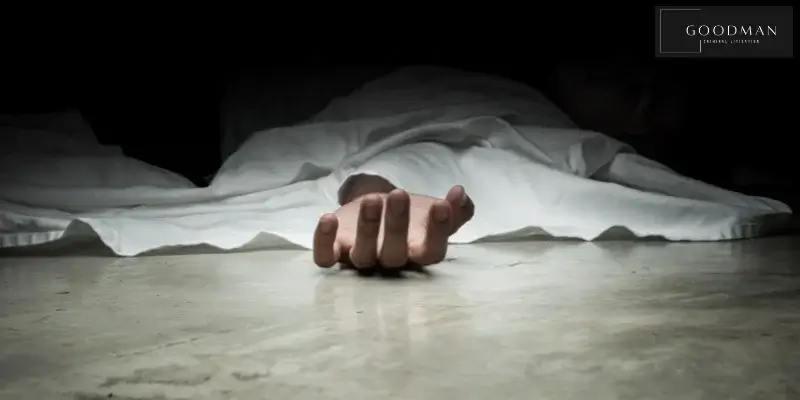Orange County First-Degree Murder Lawyer
First-Degree Murder Attorney In Orange County, CA
If you have been charged with or are under investigation for first-degree murder, you cannot afford any delay in securing help from a skilled defense attorney. Attorney Jacqueline Goodman is a seasoned Orange County first-degree murder lawyer who is always prepared to begin work immediately on assembling an effective defense for clients in these dire situations. She personally has more than 20 years of criminal defense experience, building an impressive history of successful case results along the way.
If you have been charged with first-degree murder, time is of the essence. Defending violent crime charges can be highly challenging, and it is vital that you retain legal representation at the beginning of the criminal process. The Law Office of Jacqueline Goodman can make every effort to build a successful defense by utilizing Attorney Goodman’s in-depth knowledge of criminal law and how to combat strategies frequently used by prosecutors.
Do not wait to get legal guidance if you are facing first-degree murder charges in Orange County. Call 714-879-5770 or contact the firm online to schedule a confidential consultation today.
Renowned Success Rate
Criminal cases are often complicated. There are two sides to every story, and it is important that the court sees the situation clearly. We can help defend you in your criminal case and make sure your perspective is heard.

DEFENDING AGAINST FIRST-DEGREE MURDER CHARGES IN CALIFORNIA
The defenses available in your case will depend on your unique circumstances. Fortunately, Attorney Goodman is familiar with many of the tactics that prosecutors use to obtain convictions and is prepared to counteract them with tailored, aggressive defense strategies.
An Orange County first-degree murder attorney can use advanced defense techniques to fight for your freedom, including:
- DNA results. Defense lawyers have used DNA testing to prove that their clients were not present at the scene of the crime or were not responsible for committing a particular act. This type of testing can also demonstrate that a physical object or element recovered from a crime scene does not belong to the accused person in question. For instance, DNA samples found on clothing items at a crime scene may prove that the person wearing them was not the one who committed the crime.
- Pathology. Pathology is the study of diseases and their effects on the body. It can also be used to help exonerate individuals facing murder charges. Pathology examinations can provide important evidence by analyzing the deceased’s injuries and determining how they were caused by a particular act or instrument. For instance, a pathology examination may reveal whether a stab wound was inflicted with a knife or other sharp object and whether it was done from close range.
- Ballistics and toxicology testing. Ballistics and toxicology testing can both be extremely useful in defending against murder charges. Ballistics testing examines the characteristics of firearms and ammunition by looking at the bullets, cartridge cases, and other related materials from a crime scene to determine which firearm was used in the commission of a crime. This type of evidence is invaluable to defense lawyers, as it can potentially exonerate their clients or prove that someone else committed the act. Toxicology testing can also provide valuable insight into what happened at a crime scene. For example, toxicologists may analyze tissue samples taken from victims or suspects for traces of drugs or alcohol that could have been ingested before or after an act of violence occurred. Knowing this information allows defense attorneys to better understand how intoxication may have affected a person’s decision-making capabilities at the time of the offense. Furthermore, toxicology tests can be used to look for residual poison within body tissues or fluids that might indicate intentional poisoning as opposed to accidental ingestion of something harmful. This type of evidence is especially important for those facing murder charges because it can either prove their innocence or assist with reduced sentencing if they are found guilty.
- Polygraphs and fingerprint analysis. Polygraphs can provide valuable insight into whether someone is telling the truth about their involvement in a crime, and as such, they can be used to support a defendant’s claims of innocence. This type of testing measures various physiological responses from the person being tested, including changes in pulse rate, blood pressure, and breathing. If the polygraph indicates that the subject is lying when answering specific questions about their involvement in a crime or knowledge of an offender, then it could provide sufficient grounds to reduce criminal charges or even exonerate the defendant altogether. In addition, fingerprint analysis can help determine if someone other than the defendant may have been present at the scene at the time of the crime. For instance, if fingerprints found on certain items match those of more than one person, then it could cast reasonable doubt that the defendant is responsible for the crime.
Thank you, Jacqueline Goodman!! I appreciate everything your law office has done to support in this case. Grateful for finally able to see a date, he will be able to return home.
- Anonymous
If you value your life, reputation and your future you must hire Atty Jacqueline Goodman. Just when i thought i had no options but to go to jail and get a conviction, Atty Goodman showed me otherwise and gave me a second chance and got me diversion with no conviction; she gave me my life back. She will fight for…
- Jmario S.
It is with tremendous thanks and a grateful heart that we let you know how much we appreciated your expertise, advice and phone calls on [client's name] behalf. You are a person of service and dedication.
- Former client’s parents
I don't know where to start. Honestly, I don't think I could possibly write anything that would come close to describing Mrs. Goodman's Skill as a Lawyer , she truly is remarkable at what she does. Do yourself a favor, if your in a bind, and are looking for a well respected lawyer that can produce results.... Call Jacqueline! I…
- Sharif A.
Ms Goodman and her staff were beyond helpful. I was in an extremely difficult situation that I hadn’t been in before and needed help. I was referred to Jackie and her office who were extremely helpful. Jackie and her team were extremely empathetic and knowledgeable. They were quick to respond, took action, and kept me informed. Thank you Ms Goodman…
- Nick K.
Ms.Goodman has been an amazing and thorough lawyer representing my family. She has shown up to each court date, being prepared and ready to speak to the judge. She has been a great communicator with my family and kept us informed along the way. She is authentic, and will go the long mile on your case. Choose her to represent…
- Elizabeth E.
I needed an appointment with Ms. Jacqueline Goodman and it was urgent. The best part was that she called me back immediately and I did not have to drive an hour to see her. The first meeting is free and she spoke with me for a lengthy time and she made me feel like for the first time in seeking…
- Mary P.
Ms Goodman was excellent an very professional. She took the time to understand our concerns an worries. I had 2 really bad cases facing 10+ years for trafficking, sales, an distribution between the both ... she was able to get me the best deal an walked away with probation an a new look at life. I will always recommend her…
- Joe G.
Ms. Goodman and her team is by far the best in Southern California. I literally had zero hope of getting anything but prison time on my current case and Ms. Goodman somehow got me an interview for probation. I can say it hasn’t been easy and she’s been doing a lot out of love more than any other attorney would…
- Former Client
The court was offering 9 years for 459pc. After retaining her I got the deal I wanted and even better I was free after serving just 2 years. She's an amazing attorney that you can count on.
- Aliya J.
I can't even begin to express how amazing Jacqueline was when I worked with her for a close friend's case. She was always a quick text away, and when we worried she was the vote of confidence we needed to keep going. Her office staff was also SO easy to work with. Her closing statement moved me, the family, and…
- Caleigha C.
Best lawyer! Jacqueline Goodman is an amazing lawyer, she knows her law well. She helped my brother out of a messy situation and she was always easy to contact and gave me all the information that came her way.
- Rosie C.
Jacqueline, was very professional, and knowledgeable. She listened closely, as we discussed my case. I could tell She truly cared about me. I was very pleased the outcome, and would strongly recommend Her. Honest, hard working, and compassion, would describe, Jacquie.
- Dorian C.
Ms. Jacqueline Goodman was a beacon of hope to my daughter at a time when options and hope seemed limited. Her hard work and dedication was an outcome of Excellence. Ms. Goodman’s attention to detail and knowledge of laws are truly unsurpassed. Thank you.
- Ralph S.
Jacqueline is the best! If any of my friends or family found themselves in a situation where they needed a Criminal Defense attorney I would highly recommend her. She and her staff are extremely professional and they know their stuff. I can't say enough good things!
- Travis H.
She was carring and attentive, always up front with information. She truly cares about her clients and works diligently to achieve the best possible outcome. My family and I truly admire and respect this amazing and talented lawyer. She is definitely someone you can count on for the best advice and outcome.
- Chip E.
Great attorney to work with. She's a boss and has some serious attorney swagger. When I walked into the court room with her, everybody stopped and starred. I felt like I was getting represented by a superstar attorney. She'll run circles around any DA.
- Marcus W.
HOW ARE FIRST-DEGREE MURDER CHARGES CLASSIFIED IN CALIFORNIA?
First-degree murder is always considered a felony crime in California. First-degree and second-degree murder charges differ in that first-degree murder is a homicide committed with premeditation and deliberation. Aggravating factors in a case can also escalate a charge to the first degree. The identity of the victim and how the murder is carried out are often the roots of an aggravating factor in a murder case.
Examples of aggravating factors that can escalate murder charges in California include:
- Poisoning to commit murder
- Murdering a pregnant woman
- Murdering a public official
- Murdering a police officer
The intent of the accused also typically directs the classification and degree of the crime. Consequently, the prosecution will likely focus on trying to prove you had every intention to commit murder. Part of The Law Office of Jacqueline Goodman’s defense strategy for your case could involve proving you did not, which could lower your charges to manslaughter. It is also possible that unraveling the prosecution’s perspective could cause them to falter, allowing the case to be dismissed.
IS THERE A SIGNIFICANT DIFFERENCE BETWEEN MURDER AND MANSLAUGHTER IN CALIFORNIA?
There is a distinct difference between murder and manslaughter according to California law. Whereas murder is committed when a person intentionally ends another person’s life, manslaughter is committed when a person causes the death of another person unintentionally. A common example of manslaughter is when a person is killed in an auto accident because the other driver was intoxicated or under the influence of drugs. There was no intent to kill another person, but the illegal act of driving while drunk caused a death all the same. While manslaughter charges are still extremely serious, the penalties that come with this offense are less severe than those of first-degree murder.

STRONG PROTECTION FOR MURDER CHARGES IN CALIFORNIA
There are many ways to approach first-degree murder charges, such as exoneration by proving your innocence or negotiations with the District Attorney for a reduction of your charges to the lesser crime of manslaughter. Rather than trying to navigate this complex system on your own and put your future in jeopardy, work with an experienced first-degree murder lawyer. With your case in Attorney Goodman’s capable hands, you can be confident that you have a fair chance of securing a favorable outcome.
Stand up for your rights today by calling 714-879-5770 or contacting us online.


